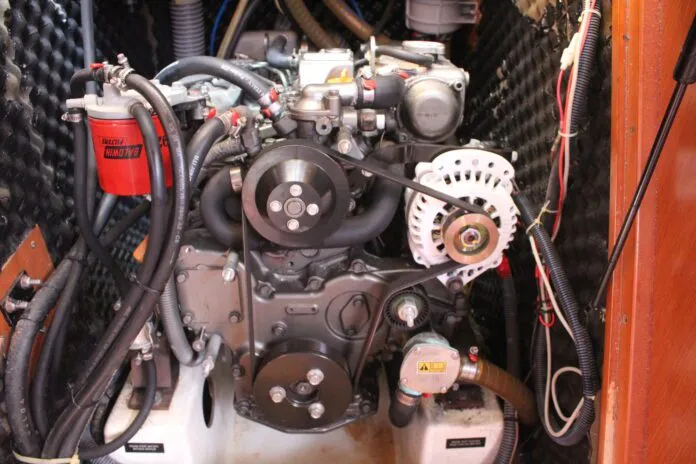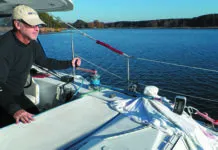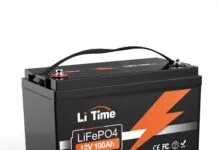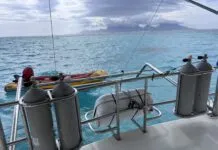
My wife Amanda has often asked fellow cruisers the question: Would you prefer to sail with an experienced mechanic who knew little about sailing, or an experienced sailor who knew little about mechanics? As an experienced sailor, I think I’d go with the former. In the last 11 years of living onboard we’ve managed to keep our Beneteau Oceanis 43 Leventeia moving with (very) basic technical skills.
Before I retired, I worked with heavy industry, improving the efficiency of maintenance systems. This was process work—I don’t have any experience of working on the tools. Generally speaking, boat maintenance was planned based on timing or milestones (for us an example would be engine hours), repairs were unexpected events prioritized on severity (e.g. being holed under the waterline) and improvements were made when inspiration struck (e.g. Amanda realized we needed more fans).
In this series, I’ll describe the difference between boat maintenance, repairs and improvements. I’ll explain how I’ve evolved from technically illiterate to an almost-useful handyman, and give a few examples of how we’ve managed maintenance and repairs in remote areas with few facilities. This first article will focus on maintenance. I consider regular maintenance as working on something before it has broken. With the right mindset, it will be seen as time spent investing in the ongoing enjoyment of your boat.
We started maintaining our mechanical equipment based on the service manuals. But the manuals are written assuming the reader has a base level of skill. Which was not me. The first time I changed the engine oil, filters and impeller on our Yanmar, I was sure I was going to end up with bits left over and oil spurting everywhere when we turned the motor over. I read the manual and managed to change what needed to be changed, then put everything back together without any drama. I then read more of the manual and realized the recommended changing of fuel lines, 2000-hour injector inspections and a myriad of other tasks would always be beyond me. Professionals would need to be called.

I was fortunate to be wintering in Sicily with many experienced cruisers, one in particular was an ex-warrant officer mechanic in the Royal Navy. He was a great interpreter of technical manuals for me— pointing out what he thought should be done and what wasn’t quite so important. As an example, the manual says to change the exhaust/water mixing elbow every 500 hours. He suggested we carry a spare elbow (which we do), but keep the original in place until it fails. The manual is a great place to start, but we are always learning from experienced operators.
FULL POWER TRIAL
One boat maintenance task we were told about is a regular full power trial. In calm conditions, Leventeia will motor at 5 knots at 1800 rpm. This is about 50 percent of maximum revs, so every 125 hours or so we will slowly open the throttle to full power. We increase revs by about 300 rpm every five minutes until we reach maximum revs, then slowly reduce the revs until we’re back to 1800 rpm. Apparently this brings the motor up to full operating temperature and helps keep the injectors and elbow clean. We need about an hour and seven or eight miles to complete this. Although Amanda and I dislike the noise and the fuss, we rarely notice any vibration or smoke either during the trials or regular motoring.
REFUELING

An important maintenance job for us is refueling. This is not always seen as boat maintenance, but when we were cruising the Red Sea and east coast of Africa we were never confident of the quality of diesel or gasoline. We developed the habit of refueling with jerry cans, then filtering the fuel through a water separating filter. We haven’t been alongside to refuel since we left Greece almost eight years ago. Although it can be more of an effort, our fuel system seems to be holding up well. We always add a fuel additive as an extra protection against fuel bug. When we had our injectors inspected in Richards Bay, South Africa the mechanic exclaimed the injectors were beeewdiful! He told us he didn’t care what we were doing but keep it up as the spray pattern was perfect.
CARBURETOR CLEANING

We met another boat maintenance expert in the Columbian island of San Andres. These islands are close to the Nicaraguan coast and experience torrential rain. Our 15-hp Yamaha outboard is usually very reliable, but I learned that when the dinghy fills with rainwater, the petrol tank floats upside down if not secured. Water was getting into the tank, and hence into the carburetor. I checked the manual and watched and rewatched several YouTube videos about cleaning the carby. But the best learning was watching this guy disassemble, clean and reassemble the unit in about five minutes. It took me about half an hour with his patient guidance, but after much practice I can now do this in about fifteen minutes. Again, we always filter the gas before refilling, and our Yammy generally starts on the first pull of the cord. Friends have commented on the ease with which we start our outboard. This not only brings a smile to our faces but also reinforces the importance of keeping the whole system clean.
BARNACLE CONTROL

Maintenance is not just important for internal combustion engines. Regular inspection and cleaning of the bottom of your boat will extend the life of your antifoul. Barnacles on the prop can also cause vibration through the shaft which can be very annoying. We used to haul out every 18 months or so to redo the antifoul with whatever paint was available. Off the east coast of Africa, top quality anti-foul wasn’t always available, so we used whatever was on hand. A great tool for cleaning the bottom is our small 12-V Pro Dive air compressor. In warm, temperate waters we would enjoy diving every four to six months to keep the barnacles under control. Since we copper coated two years ago, we simply wipe down the bottom with very little apparent reduction of the copper coat. It is harder to convince ourselves to do this in the cold waters of Nova Scotia, but we still think it is an important process. If you want more information on anti-foul, Practical Sailor has many great articles with expert technical advice. See “Real World Antifouling Testing,” “Antifouling Paints Abroad” and “Antifouling for Brackish Water.”

DAILY HABITS

Small things such as coating the threads of bolts with LanoCote before use, or undoing lazy knots in the lines before they tighten, are all part of our maintenance mindset. We view many of our daily tasks as boat maintenance. As we weigh anchor, we scrub the chain with a stiff broom to clean off the mud, then when it rains we open the anchor hatch to try to rinse the cable with fresh water. Six years ago in Kiliffi Creek in Kenya, the boatyard regalvanised the chain for us. Their very effective method of cleaning the chain was to tow the entire length behind a tractor along a gravel road! We have just replaced our anchor cable after 14 years.
RIGGING TENSION

Another example of our regular inspection is the standing rigging. I once asked an old rigger how he knew when the rigging had become loose. I was expecting a discussion on the tension levels of the upper and lower shrouds, backstay adjustment, et cetera. Instead, he suggested putting a wrap of electrical tape on the thread of the shrouds directly above and below the bottlescrews. If there is any loosening of the shrouds, the tape will be seen to move away or over the bottlescrew. It made sense to me, so now we can quickly see if the rigging needs any adjustment based on the position of the tape. (Photo 5. Low-tech rig tension monitor).
CONCLUSION

My boat maintenance skills have increased dramatically over the last 11 years. They had to! I am always learning from the advice and time which experienced cruisers willingly share. If you have internet connection, YouTube can be a great resource for specific, detailed guidance. Another invaluable reference is Nigel Calder’s Boatowners’ Mechanical and Electrical Manual. This always increases my understanding of whatever system I need to work on.
Maintenance is a constant requirement to prolong the life of our equipment and systems. With the right mindset we hope to keep Leventeia running for many years yet. When my mind is not right and I complain about changing the oil or inspecting the bottom, Amanda chides me by asking if I’d rather be mowing the lawn every weekend. My appreciation for maintenance quickly returns.

































Very good points made here and I hate to admit maintenance that I know I should have done and have skipped…
I even have a SS with a maintenance tab…
Ok, re-inspired to do better maintenance…
I suspect the fulltime marina liveaboard is making me lazy…
The only maintenance I don’t have to do anymore is my old Yanmar now replaced with a 48v PMAC… Laff…
Fair Winds…
A very thoughtful article on the virtue of maintenance aboard being proactive. One thing that preoccupies me a propos to my Yanmar is the cleanliness of the diesel fuel long before it reaches the injectors, a point made in this article and one that Nigel Calder certainly drives home in his book that Brett cites.
I don’t quite understand the rig tension tip. Wouldn’t that only be applicable if the turnbuckle rotates? But they shouldn’t rotate since they are cotter pinned.
In fact, the boat can change shape from sitting on the hard or slowly creeping under rig tension. Temperature also matters. The extent to which the rig can become slack varies with the materials and the design of both the boat and the rigging.
I agree with the first premise, a good mechanic is a blessing. For the 2013 Salty Dawg rally to the Caribbean, we were fortunate to find a fisherman who had been a helicopter mechanic in the military. He made repairs to our dinghy outboard and helped me rebuild a Volvo Penta raw water pump. He topped it off by catching a 45-pound wahoo six days out and filling multiple freezer bags with pieces of the fish. He also cooked some up a fish fry that we shared with other Salty Dawgs when we reached the BVI.
Many moons ago (52 years) I was told to pour normal sugar Coca Cole into the rigging swashes and then seal them with epoxy. 52 Years later, no sign of corrosion and no failures
I though the first paragraph posed an interesting question. As an experienced sailor and an experienced bodger (I’ve worked with real craftsman–I’m there is a few areas but nowhere near all!) I think it depends on the length of the trip.
For a short trip I would take the sailor. I can fix what is necessary if there is someone to tend the boat and lend an occasional third hand. There is no time to teach anything significant.
For a long trip to remote areas I would give serious consideration to the craftsman. First, he would not be a complete non-sailor; taking someone across an ocean that might not like being out of sight of land is just a mistake. I will have plenty of time to teach sailing and seamanship, since that is what we are doing. There would be little opportunity to teach mechanical skills until they were needed, and a person with no mechanical skills, honestly, has not tried to learn them through life’s many opportunities. At the very least the person should have general mechanical aptitudes, though not necessarily a boat-specific set.
If I were re-building a boat before a long trip I could go either way. The non-mechanical sailor will have lots of time to learn, if he is interested, and if not, he’ll give up.The non-sailing craftsman will at least endure lots of sailing conversation, and I’d get him out on the water on some boat, just to see how he took to it. So either way.
I’ve sailed with both sorts. In fact, the important things are how the two of you deal with pressure together, and how well you can pass long hours together. The sailing and fix-it will come along, as needed.
The only time that I’ve had diesel engine failure was diesel fuel bug from using road fuel with high bio-diesel content and no biocide. I now try to use FAME free fuel and add Marine 16 Complete additive. No problems ever since (touch wood!)